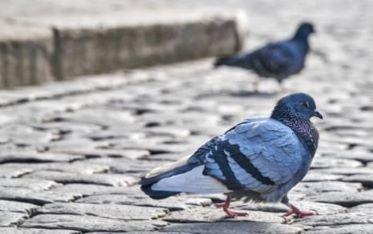Feral Pigeon advice
Feral Pigeons are common throughout all urban areas in Britain and originated from rock doves and domestic pigeons.

Pigeons are good at scavenging food and many people feed pigeons with food scraps.
Pigeons are well adapted to living in towns as they are able to roost and breed in situations other birds would find unsuitable.
In good conditions, with access to a regular food supply, a breeding pair can produce a dozen eggs per year. The young quickly mature to breeding age, therefore pigeon numbers can increase rapidly.
Whilst some people like pigeons a large pigeon population in a town does have some detrimental effects. The places pigeons roost or visit regularly become fouled with droppings and even dead pigeons. This results in giving an unsightly appearance to an area and increasing the costs to the council of keeping town centers clean and tidy.
The droppings if left for a long period can cause damage to a building and their removal would be at the expense of the building owner. Proofing of buildings using netting, wires or spikes can be used to prevent roosting. The building owner will need to employ a specialist pest contractor to do this. Pigeons do not significantly contribute to the spread of diseases to humans, although contact with their droppings does pose a minor risk of contracting some infections e.g. histoplasmosis, chrysorrhoea and psittacosis.
Pigeons themselves suffer the most as a result of feeding off food scraps in urban areas and living in a town environment. The food scraps pigeons usually feed off lack the nutrients to keep them healthy so whilst pigeons living in towns may look well fed they often suffer from malnutrition. They are also exposed to a greater risk of injury and town pigeons can often be seen with missing toes and/or deformed wings, beaks etc.
How can the council help?
The council works with animal welfare groups experienced in dealing with pigeons to ensure it takes informed and effective steps in dealing with pigeons on its own buildings.
The council encourages building owners to pigeon proof their buildings and to store their food waste suitably.
In certain circumstances the council has powers under the Prevention of Damage by Pests Act 1949 to take action against landowners/occupiers who do not store their waste appropriately. Whilst it is not an offence to feed pigeons, throwing food onto the floor in a public area can encourage rodents.
The council continues with regular street cleaning to remove pigeon mess and discarded food scraps. If you wish to report a pavement which needs cleaning please telephone the council’s Waste Management Unit on 01474 337000.
How can the public help?
The size of a pigeon population is largely controlled by the availability of food. Pigeons control their own numbers very effectively to match the food supply by reducing the frequency of their breeding. Therefore by reducing the food available to them their numbers will fall naturally without causing starvation amongst the pigeon population, the remaining smaller population will be healthier as a result of having to revert to a more natural pigeon diet.
You should therefore not feed feral pigeons, your food waste must be disposed of appropriately and if feral pigeons are roosting on your property you should suitably pest proof your property. Advice on this can be obtained from local pest control companies.
If you require further advice you can contact the council’s Animal Control Officer via Health Admin on telephone number 01474 337000, or animal.control@gravesham.gov.uk Alternatively you can contact the Pigeon Control Advisory Service on telephone via email at enquiries@picasuk.com or visit their website

